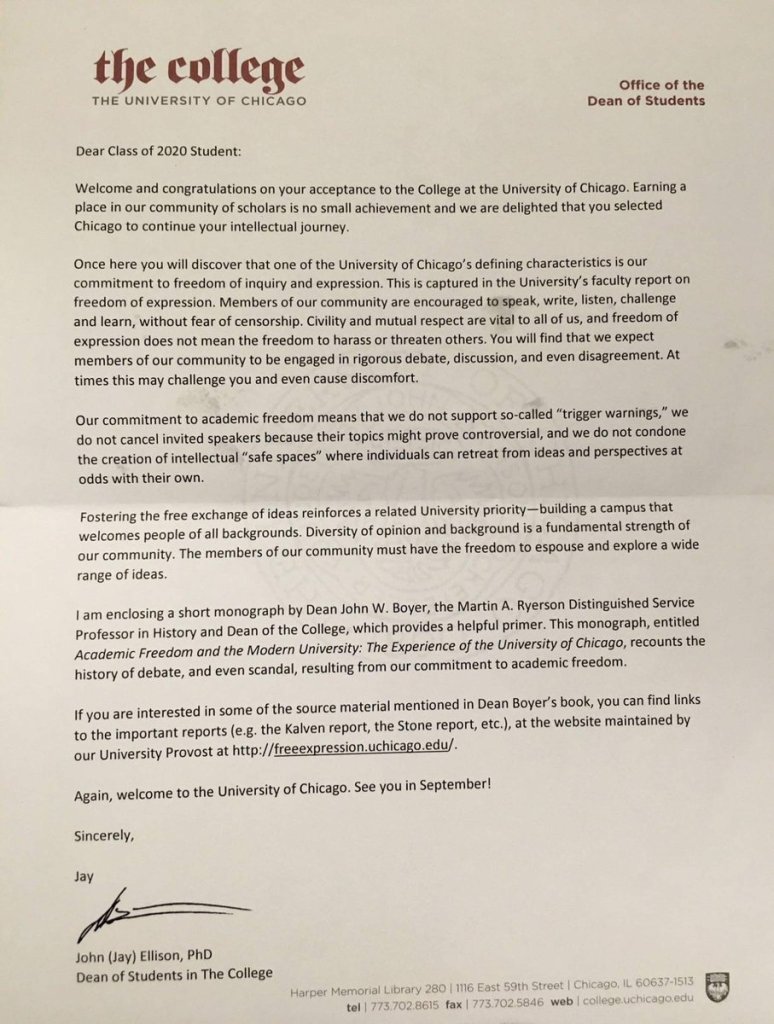Virginia and I just spent the last forty-five minutes or so discussing the recent letter from the Dean of Students of The College at the University of Chicago (our alma mater). It’s been in the news and all over the Internet, with plenty of “we love it!” or “we hate it!” reactions.
You can and should read the letter itself before continuing here.

The Chicago Maroon posted it to Twitter with the headline, “In a welcome letter to freshmen, the College made clear that it does not condone safe spaces or trigger warnings.” I have to admit I read it the same way, and was very unhappy with it.
This morning, I asked Virginia about it as part of our normal Sunday conversations. She replied to say that she had skimmed it and while she wasn’t 100% comfortable with it, she supported the general sentiment with respect to freedom of expression. I declared that the letter was terrible, which then sparked pretty much what our university stands for: a debate of ideas and perspectives, even when that’s not comfortable. It also led to both of us more closely reading the letter and conducting more rigorous analysis.
We quickly found that the bone I had to pick with the letter was only in the third paragraph. Overall, we support the University’s position on academic freedom and freedom of expression, best summarized in the 2015 Report of the Committee on Freedom of Expression, chaired by Geoffrey Stone. This report is both concise and nuanced, laying out the intellectual values of the University.
In contrast, the third paragraph is blunt, perhaps even abrupt. I took umbrage with two parts. First, “safe spaces” in quotation marks. This is contextualized before and after to focus on intellectual discourse, which Virginia argued was the right idea. I countered that the term had been used more recently to describe places where marginalized people could go to discuss matters important to them without fear, and that in our social and political climate the use of the term in a negative way was at minimum a poor choice of language. Second, the term “trigger warnings” was definitely used in a dismissive tone, modified by “so-called.”
I admit I leaned too heavily on my previous work experience in higher education to bolster my arguments, thereby attempting to shut down Virginia’s point of view on these. Rightly, she called me out on that and demanded an exchange of ideas rather than a polemic on my part. This watershed moment led to a better, more inquiry-driven dialogue attempting to parse the language and derive meaning. We reached agreement after some time on the following:
- Overall, the University saying it supports freedom of expression, even when that exchange of ideas may be uncomfortable, is a good thing. College should be about having your worldview challenged, being open to new ideas, and being ready to defend your perspective in a rigorous way.
- This has to sit alongside a commitment to inclusion for all students, which may well mean support for safe spaces in the more recent usage. That should have been included in the letter to help convey the totality of the College’s approach and aid in the students’ (and parents’) expectations for the student experience.
- We both found the message a little off because it came from the Dean of Students rather than the Dean of the College. According to their website, “The Office of the Dean of Students in the College provides undergraduates with assistance and support throughout their years in the College.” Assistance and support don’t really come through in this message. We both thought the Dean of the College, whose office “handles the academic and administrative matters for the College” should be the one issuing messages about academic freedom and freedom of expression.
- We also questioned whether the statement, “we do not support so-called ‘trigger warnings’,” unnecessarily put faculty and students in a pro- or anti-institutional position. Presumably each instructor will determine for herself whether and to what extent to have trigger warnings based on the class material and their personal views on the matter without the College needing to make a statement.
At the end, neither of us were wholly comfortable with the letter, even as we support the overall intentions behind it.
Returning to the first item on the above list, we’re more than fifteen years out of college at this point, and we still strive to abide by its values of free expression (recall Virginia calling me on being domineering in my opinion and the resulting shift in the discourse). That we do so is at least one indicator of the importance of sustaining that commitment to the marketplace of ideas, dialogue and debate based on reason, and willingness to end a conversation someplace other than where you started.

1 Comment